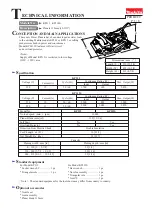
Chapter 6: Oximetry
Operation Manual SurgiVet
®
V3404 Plus
6-9
Tail Wrap Sensor and Reflectance Sensor
In most animals, wet and part the fur at the ventral tail base and use the straps on the tail wrap to hold
the tail wrap sensor in place.
When using the reflectance sensor, wet and part the fur at the ventral tail base and use non-adhesive
tape to hold the sensor in place. The reflectance sensor may be used rectally if the patient has a small or
no tail.
It may be necessary to shave a small spot on the ventral tail base in patients with a thick undercoat, such
as a Husky.
Limitations
Experience will quickly tell you which probes work best under different conditions. Fur, dark pigmentation,
poor perfusion, and movement can all affect the sensors ability to obtain accurate readings. Well-perfused sites
with little or no hair are preferable. It is also important to note that some anesthetic drugs, such as Xylazine
(Rompun), Acepromazine, or Medetomidine (Domitor) can affect peripheral pulse pressures causing very weak
pulsations. All pulse oximeters require a good quality pulse to work properly. Other drugs, such as ketamine,
can cause the tongue to twitch, limiting the use of a lingual clip on that site.
Checking the Oximeter’s Performance
Pulse oximeters do not require user calibration. If checking the function of the device is desired, an optional
Oximetry/ECG Patient Simulator (SMPM catalog number 1606) is available as an accessory. The simulator
attaches to the oximeter in place of the sensor or oximetry cable. It provides a known SpO
2
and pulse rate signal
to the oximeter. This allows the oximeter’s performance to be checked.
NOTE! The 1606 Oximetry/ECG Patient Simulator does not calibrate the monitor; the monitor does not
require calibration. The 1606 provides a known SpO
2
and pulse rate to the monitor that allows
you to check the monitor’s performance.
NOTE! The 1606 Oximetry/ECG Patient Simulator cannot be used to assess the accuracy of a pulse
oximeter and/or sensor.
NOTE:
2
Follow the instructions included with the 1606 Oximetry/ECG Patient Simulator.
•
•
•
















































